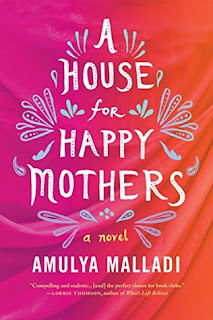In A House for Happy Mothers, Amulya Malladi tackles
some of the moral and ethical issues surrounding surrogacy programs in India.
Priya, an American born half-Indian, and her native Indian husband Madu, are
living the perfect life in Silicon Valley, save a child or two. After several
miscarriages, and considerable strain to their relationship, they try one last
time, via a surrogate in India. The baby is genetically theirs, but growing
inside the womb of Asha, a poor but proud mother of two. Asha has been coerced
into this by her family as a way to help secure their financial future and
provide a better education for their gifted son, but struggles to remain
detached from the life growing inside her.
This
book explores all of the questions that surrogacy in a poor country raises.
Yes, it’s providing a large sum of money to someone who probably lives on $2 a
day, but at what cost? There is a lot of shame associated with this practice,
and the women must pretend it never happened. They must go through all the
toils and discomforts of pregnancy and labor, without the gift of a child at
the end. We also see some characters coming back for a second or third time, as
either the money was squandered initially or because for a poor person, there
is never enough really.
While
there is a very hopeful and uplifting message to this book, having just read
and watched A Handmaid’s Tale and its
forced surrogacy program, it’s hard not to see some parallels. Apparently there
are more laws in place now to help protect the surrogates, and efforts have
been made to eliminate some of the worst offending “baby mills,” but it’s easy
to see how this is a situation still ripe for exploitation.
Finally, I listened to the audio version of this
book, and it is wonderful! The narrator, Deepa Samuel, does an amazing job with
literally dozens of different characters voices. She manages to create a unique
Indian accent for each one, and her performance was truly stunning. This is
definitely a book worth listening to.

No comments:
Post a Comment